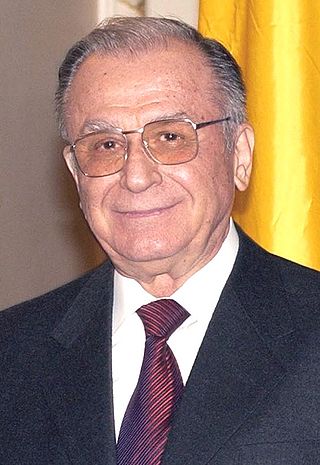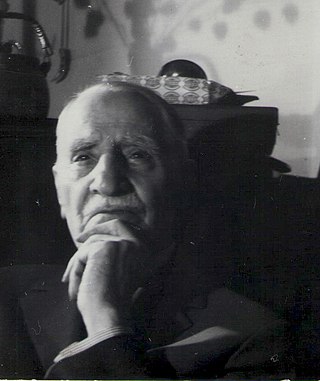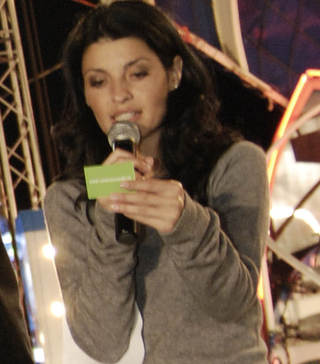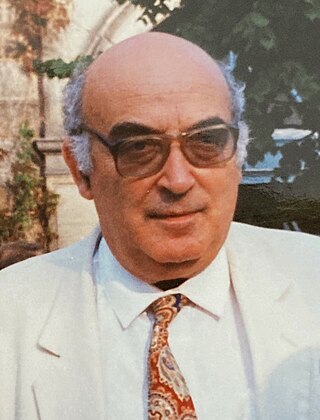
Ion Iliescu is a Romanian politician and engineer who served as President of Romania from 1989 until 1996 and from 2000 until 2004. Between 1996 and 2000 and also from 2004 to 2008, the year in which he retired, Iliescu was a senator for the Social Democratic Party (PSD), of which he is the founder and honorary president to this day.

The Social Democratic Party is the largest social democratic political party in Romania and also the largest overall political party in the country, aside from European Parliament level, where it is the second largest by total number of political representatives, after the National Liberal Party (PNL). It was founded by Ion Iliescu, Romania's first democratically elected president at the 1990 Romanian general election. It is currently part of the National Coalition for Romania (CNR), which is a big tent grand coalition comprising also the National Liberal Party (PNL). The CNR formerly included the Democratic Alliance of Hungarians in Romania (UDMR/RMDSZ) until mid June 2023.

The Democratic Party was a social democratic and, later on, liberal conservative political party in Romania. In January 2008, it merged with the Liberal Democratic Party (PLD), a splinter group of the National Liberal Party (PNL), to form the Democratic Liberal Party (PDL).

The National Salvation Front was the most important political organization formed during the Romanian Revolution in December 1989, which became the governing body of Romania in the first weeks after the collapse of the communist regime. It subsequently became a political party, the largest post-communist party, and won the 1990 election with 66% of the national vote, under the leadership of then-President Ion Iliescu, who was elected with 85% of the vote.
Silviu Brucan was a Romanian communist politician. He became a critic of the dictatorship of Nicolae Ceaușescu. After the Romanian Revolution, Brucan became a political analyst.
Vladimir Tismăneanu is a Romanian American political scientist, political analyst, sociologist, and professor at the University of Maryland, College Park. A specialist in political systems and comparative politics, he is director of the University of Maryland's Center for the Study of Post-Communist Societies, having served as chairman of the editorial committee (2004–2008) and editor (1998–2004) of the East European Politics and Societies academic review. Over the years, Tismăneanu has been a contributor to several periodicals, including Studia Politica, Journal of Democracy, Sfera Politicii, Revista 22, Evenimentul Zilei, Idei în Dialog and Cotidianul. He has also worked with the international radio stations Radio Free Europe and Deutsche Welle, and authored programs for the Romanian Television Company. As of 2009, he is Academic Council Chairman of the Institute for People's Studies, a think tank of the Romanian Democratic Liberal Party. Between February 2010 and May 2012, he was also President of the Scientific Council of the Institute for the Investigation of Communist Crimes in Romania.

Iorgu Iordan was a Romanian linguist, philologist, diplomat, journalist, and left-wing agrarian, later communist, politician. The author of works on a large variety of topics, most of them dealing with issues of the Romanian language and Romance languages in general, he was elected a full member of the Romanian Academy in 1945. He was head of its Institute of Linguistics between 1949 and his retirement in 1962.

Corina Crețu is a Romanian politician and a former European Commissioner for Cohesion and Reforms. Crețu is a member of the Romanian PRO Romania and Member of the European Parliament. Between June 2014 and October 2014, she served as a Vice-President of the European Parliament.

Dumitru Țepeneag is a contemporary Romanian novelist, essayist, short story writer and translator, who currently resides in France. He was one of the founding members of the Oniric group, and a theoretician of the Onirist trend in Romanian literature, while becoming noted for his activities as a dissident. In 1975, the Communist regime stripped him of his citizenship. He settled down in Paris, where he was a leading figure of the Romanian exile.

The Democratic Liberal Party was a liberal-conservative political party in Romania. The party was formed on 15 December 2007, when the Democratic Party (PD) merged with the Liberal Democratic Party (PLD). On 17 November 2014 the PDL officially merged into the National Liberal Party (PNL), ceasing to exist. The PDL was associated with Traian Băsescu, who was previously leader of the PD and President of Romania from 2004 to 2014.

Marcela Lavinia Șandru is a Romanian politician, journalist and actress. The former president of the National Initiative Party (PIN), she was also vice president of the National Union for the Progress of Romania (UNPR). She was a member of the Romanian Chamber of Deputies for Mureș County from 2004 to 2008.

Irina Petraș is a Romanian writer, literary critic, essayist, translator and editor.

Ovidiu Sincai Social Democratic Institute Foundation is a non-governmental organization from Romania.
The Social Democratic Party of Romania was a Marxist social-democratic political party in Romania. A member of the Second International, the party was active between 1910 and 1916, when it was banned. Clandestine groups continued underground activity until 1918, when the end of World War I allowed the party to re-emerge as a legal political group, rechristened Socialist Party of Romania.

Dumitru Almaș was a Romanian journalist, novelist, historian, writer and professor. His prolific output included children's literature, historical novels and textbooks. He was honored by both the Romanian Writers' Society and the subsequent Writers' Union of Romania. He also served as a member of the board of Society for Historical Sciences of Romania.

Paul Bujor was a Romanian zoologist, physiologist and marine biologist, also noted as a socialist writer and politician. Hailing from rural Covurlui County, he studied biology in France and Switzerland, where he was attracted by left-wing ideas; his evolutionary biology, informed by the work of Carl Vogt, veered into Marxism and irreligion. Returning to the Kingdom of Romania, he was a junior member of the Romanian Social Democratic Workers' Party, active on its moderate wing. He earned the critics' attention in the 1890s as a short story writer with a socialist and pacifist message, but only returned to fiction writing briefly, in the 1930s. An award-winning ichthyologist, Bujor was hired by the University of Iași, where he taught for 41 years, and throughout the period worked on documenting the Black Sea fauna, and made discoveries concerning the environment of Techirghiol Lake. He inaugurated the Romanian study of animal morphology, while also contributing to histology, embryology, and parasitology, and gave popular lectures on evolution and physical culture.

The National College is a high school located at 4 Arcu Street, Iași, Romania.

Mihai Viteazul National College is a high school located at 62 Pache Protopopescu Boulevard, Bucharest, Romania. One of the most prestigious secondary education institutions in Romania, it was named after the Romanian ruler Michael the Brave.

Laszlo Alexandru is a Romanian essayist, literary critic, literary historian, translator and journalist. He is an Italian teacher. He is editor of E-Leonardo cultural magazine and coordinator of the Italian collection at the "Ecou Transilvan" Publishing House. He is known for his Dante interpretation contributions in the university field in Romania and in Europe, in the Romanian culture and in the Italian culture. Also known in Israel for his cultural studies on the Holocaust. Since 2014, he is a member of the Romanian Writers' Union. His books have been published in Romania and in the Republic of Moldova. He won the Romanian Writers' 2020 Special Award for Lectura lui Dante. Infernul; Purgatoriul; Paradisul.

Iosif Sava-Segal, known as Iosif Sava, was a Romanian musicologist and pianist. He was particularly renowned for his decades-long live radio and television shows during which he invited famous personalities from different realms of Romanian culture to discuss their perspectives of the cultural phenomenon.

















